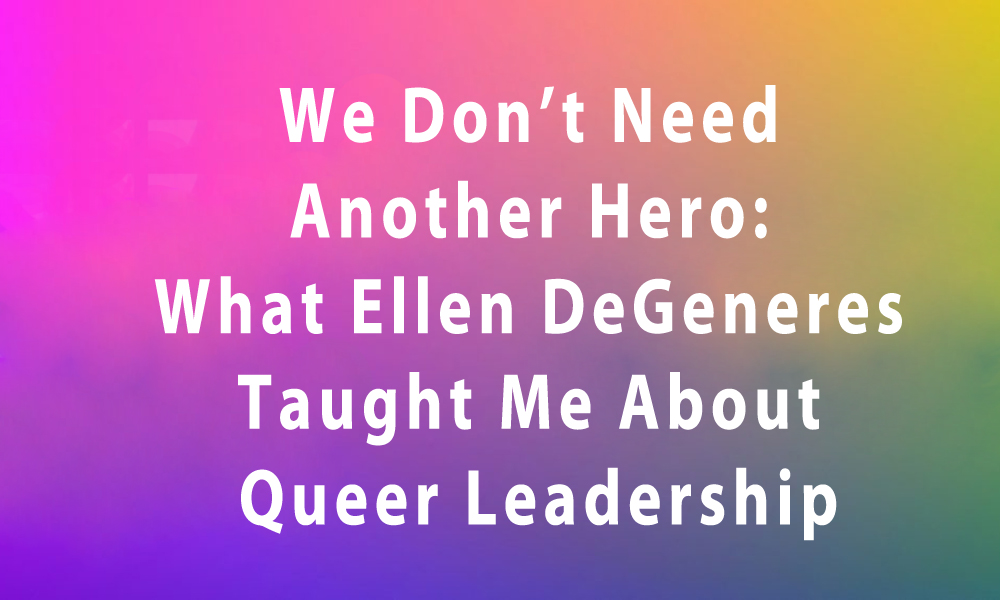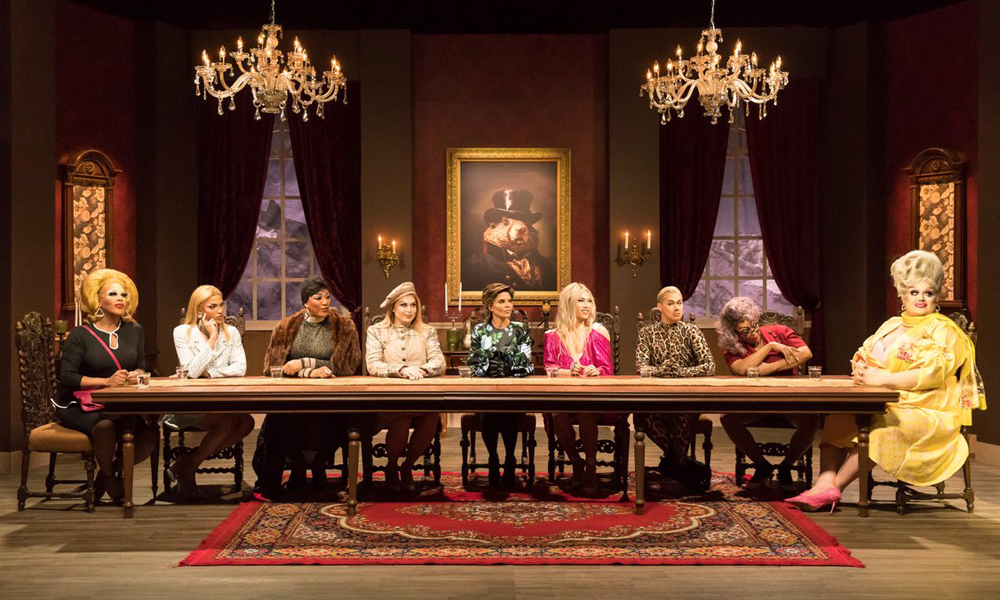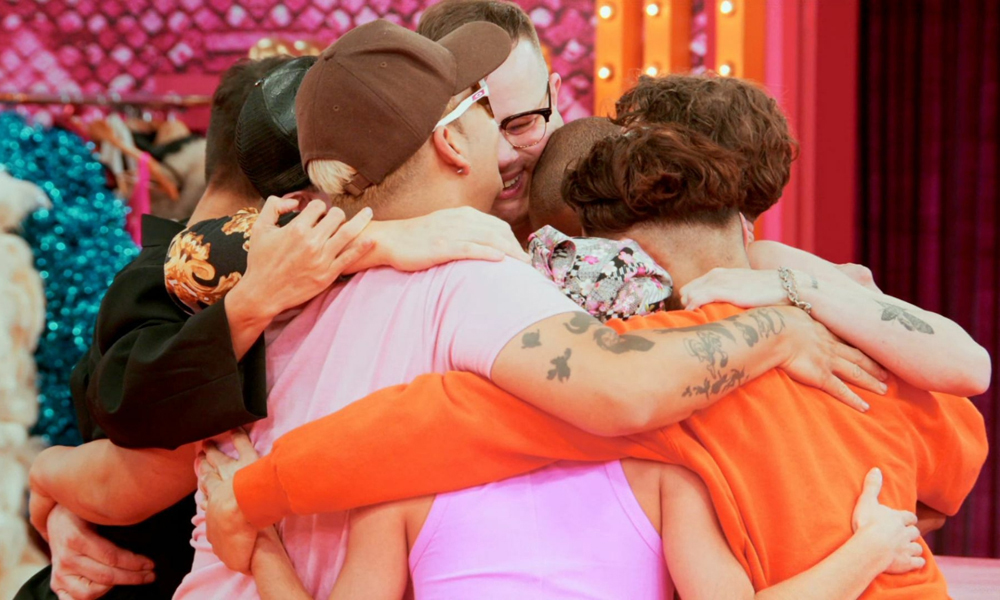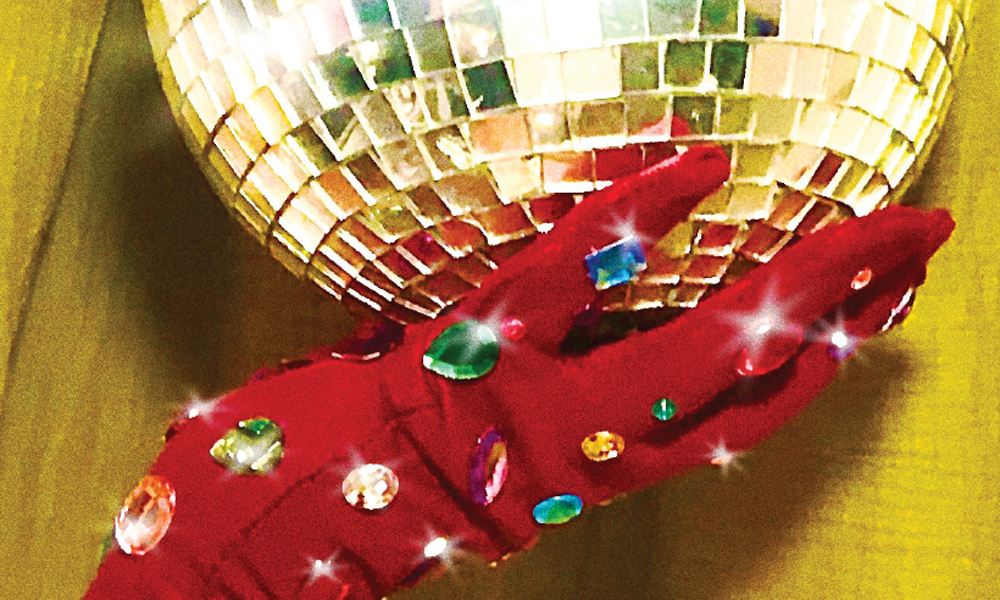She was my hero. Until she wasn’t…
By Colin Druhan
When I realized I was queer, one of the things that worried me about coming out was what kind of job I would be able to get when I grew up. Based on the movies and TV shows I had seen, gay men were all musical actors, hair stylists and florists. I can’t act, I can’t sing and my sense of style leaves something to be desired (at least that’s what I’ve been told). Without realistic queer role models, my options felt crushingly limited. Then, in 1997, the star of my favorite TV show came out as gay on the cover of Time Magazine. So did the character she played on her eponymous sitcom, with some help from a therapist played by Oprah Winfrey. Ellen DeGeneres became my role model: a queer person who achieved success with authenticity, on her own terms. She was my hero. Until she wasn’t.
Without hindsight it’s easy to discount the significance of DeGeneres coming out twenty three years ago. As Barack Obama remarked when he awarded her the Presidential Medal of Freedom, “her courage and candor helped change the hearts and minds of millions of Americans, accelerating our nation’s constant drive toward equality and acceptance for all.” But her sitcom was cancelled by ABC the season after she came out and her second run at a half-hour primetime show, this time with CBS, was a failure. It wasn’t until she hosted the Emmy Awards just two months after the attacks of September 11, 2001 that her career began to crawl back to where it had been. Since then, her daytime television program The Ellen DeGeneres Show has won thirty two Emmy Awards, she has been the face of global brands like CoverGirl and she has become the seventh most followed user on Twitter.
That kind of popularity comes with scrutiny. A recent investigation prompted by allegations that DeGeneres fosters a toxic workplace found cause to dismiss three senior producers from The Ellen DeGeneres Show. The reported offenses of Ed Glavin, Kevin Leman, and Jonathan Norman range from managing through fear and intimidation to sexual harassment to assault. Other complaints about the broader management team include such pervasive workplace issues as anti-Black racism and employees being fired after taking short-term medical leave. DeGeneres denies that she had previous knowledge of any of these transgressions, positioning herself as someone so removed from the day-to-day that she couldn’t possibly have stopped what was going on. However, I feel one former The Ellen DeGeneres Show employee said it best in a statement to BuzzFeed: “If she wants to have her own show and have her name on the show title, she needs to be more involved to see what’s going on.”
It’s not the first time that DeGeneres has been unaware of how her privilege, socioeconomic status and public standing bias her perspective. She has an estimated net worth of over $300 million, which may explain why her dealings with, and opinions of, overtly homophobic figures like the comedian and actor Kevin Hart and former U.S. President George W. Bush might differ from others in queer communities. “Just because I don’t agree with someone on everything doesn’t mean that I’m not going to be friends with them,” said DeGeneres on her talk show shortly after receiving wide public criticism for sitting with Bush at a Dallas Cowboys game last year. In the course of winning a total of four GLAAD Awards she apparently failed to learn that, for many queer and trans people, the “disagreements” she gestures to often result in rejection from family, inequal access to jobs, limited options for social support, physical violence and death.
The desperation our communities have felt under injustice have always produced remarkable role models for queers of any age to look up to. A movement that lots of people think to have started at The Stonewall Inn in 1969 is actually much much older and simply under documented. Even if I focus only on heroes active in my lifetime I am amazed. In the 1980’s and 90’s the AIDS Coalition to Unleash Power, known as ACT UP, didn’t just raise awareness through protest and advocacy for people living with HIV/AIDS. They revolutionized the way drugs are identified and tested through groundbreaking partnerships with regulatory agencies and pharmaceutical companies. When Black Lives Matter Toronto briefly halted the 2016 Toronto Pride Parade one commentator said they had “overplayed their hand” when they “went after the police community”, an opinion disappointingly shared by lots of queers at the time, most of whom were white. It turns out by speaking the truth about their experiences with police BLM Toronto was contributing to something huge. Now millions of protestors, world leaders and giant corporations are following their lead, using their hashtag and inching toward systemic change. People like Monica Roberts, who has documented the deaths of trans people on her blog TransGriot since 2006, fill voids left by public institutions and a media that doesn’t even try to report on queer and trans issues in a respectful way. Leaders like Roberts, who shows reverence for our lived experiences and humanity, are known in queer and trans circles. But they go widely underrecognized in mainstream culture. Many journalists seem to find it far more interesting to focus on issues like trans people serving in the military, which is attention-grabbing to a lot of straight cis people but falls low on the list of priorities many of our community’s leading activist keep.
It’s clear to me that, as a community, we haven’t been constantly disappointed by our heroes because we have few of them. It’s just that to get to the very top, too many queer and trans leaders need to compromise their allyship to marginalized communities in order to be taken seriously by those who have traditionally been in charge. Ellen DeGeneres engages in, or at least turns a blind eye to, reprehensible employment practices in order to keep up the pace required of an Emmy winning talk show. Openly gay Apple CEO Tim Cook, who is rarely vocal about queer issues and has said he timed his 2014 coming out to make sure it was not a “distraction” from his company’s business interests, did nothing in response to his Board’s decision to reject an externally-developed diversity strategy because it was, in their view, “burdensome and not necessary” despite the company’s management being over 80% white. Rupaul Charles routinely faces warranted public criticism for his anti-trans rhetoric and what former Rupaul’s Drag Race contestants say is the “conscious exclusion” of trans women from the show’s casting process. Caitlyn Jenner, dubbed the “most famous openly transgender person in the world”, consistently propagates political ideology that directly endagers the lives of trans people. The cultural significance and achievements of each of these figures truly can not be understated. That’s why it hurts so much when they let us down.
There’s a line from Verna Myers’s wildly popular TED talk that people in corporate circles love quoting: “Diversity is being invited to the party; inclusion is being asked to dance.” It’s a lovely sentiment that, taken out of the context of the full talk, often loses its edge. It would serve us all well to absorb Meyers’s entire presentation, which is ultimately about the benefits of embracing that of which we are most afraid. The future of work requires us to push further than one pithy line. We must question whose party we’re at, anyway. The notion mistakenly taken from Myers’s quote is often that those in dominant positions, at least demographically speaking, are the gatekeepers of success for people who are marginalized. Too many people, even in our own communities, believe that cis straight people are the masters of queer and trans destinies and that we must defer to their greater wisdom to get ahead. From the culture that this attitude creates the lessons many queers learn early in our careers is to be clear about who we are, but to act straight or to seem cis enough to fit in. We are asked to add diversity, but told to pipe down in meetings. We’re encouraged to be proud of who we are, but to not be so prideful as to make cis straight people uncomfortable with their own genders and sexualities. And we’re taught not to ever suggest that our employers rethink business practices that keep many of us out of the workforce. That would require those organizations to do things differently instead of just adding a rainbow treatment to their logo one month per year.
Icons can break boundaries and still struggle to keep up with a culture that is shifting with increasing rapidity. What the blunders, missteps and misdeeds of Ellen DeGeneres, Tim Cook and all of us who have had to put our queerness on a shelf in order to get ahead have taught me is that our most promising queer leaders can’t just wait to be invited to dance. They need to seize opportunities to show everyone on the floor their impressive moves. Because if there’s one thing I know about queer people, it’s that we throw damn good parties.
—
COLIN DRUHAN is the executive director of Pride at Work Canada/Fierté au travail Canada, a not-for-profit organization that empowers employees to foster workplace cultures that recognize all employees, regardless of gender identity, gender expression and sexual orientation. For more information, visit prideatwork.ca.






Vanessa Sheridan / 27 August 2020
What an excellent, insightful, and important article! Colin, you have articulated exactly why it’s important to hold our “leaders” to high standards. We’re all human and make mistakes, but those who are in highly visible positions have an extra, added responsibility to be aware of what’s going on around them. The LGBTQ community is doing amazing things–and we must hold our “leaders” to account. With great privilege comes great responsibility. If you want to reap the rewards of success, then you have an undeniable obligation to try your hardest to always do the right thing.